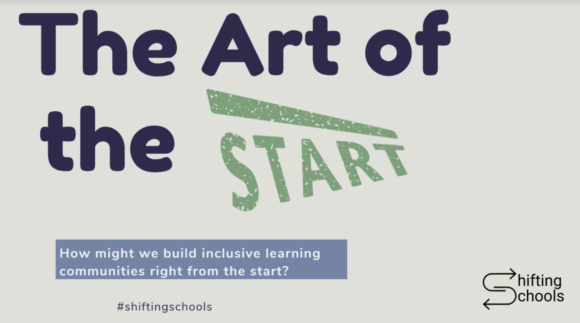
The Art of the Start – Free Guide
As an educator I know first hand what an art it is to teach, and I know first hand how important and powerful it is to launch learning and to foster a learning community right from the start of the school year or start of a new semester. You don’t need me to tell you that this year is a unique one, but I’d be remiss if I didn’t make space for that reality. Students and educators alike have been through some extremely difficult times, and of course we are still in the middle of a global pandemic.Â
Inside our free guide ‘The Art of the Start’ you’ll find seven different sections, each one with ready to roll out resources. These seven sections have been designed based on emails we’ve received from educators like you. Today I want to specifically talk about the seventh section which places an emphasis on the power of play. In her Edutopia article, Sarah LaHayne writes the following about play :
“Play is not only foundational for child development but can also help children process and heal from the impact of living through stress, trauma, or grief, including a global pandemic.â€
Sarah LaHayne
I think as adult learners we also need to remember how powerful play can be for us. In an NPR interview, Dr. Stuart Brown, head of a nonprofit called the National Institute for Play. gives us a definition of play:
“Play is something done for its own sake,” he explains. “It’s voluntary, it’s pleasurable, it offers a sense of engagement, it takes you out of time. And the act itself is more important than the outcome.”
Dr. Stuart Brown
This is why I set my alarm early a few days of the week to do a little yoga. For me, yoga has been a wonderful way to play and stay playful. I might not get every pose exactly right, and I may not always be aspiring to become an expert, and that’s completely ok. As a matter of fact, it is probably because I don’t have a strict goal with my yoga that I’m able to focus on just enjoying it for the sake of enjoying it. They call it the yoga practice…you never really master yoga, you constantly are just practicing. I often say the same thing to educators about teaching. They call it the teaching practice…there is no mastery of teaching. We are constantly practicing, finding that balance between the art of teaching and the science of teaching. If we can get into a mindset that this is all just practice, then we allow ourselves to try new things, push ourselves in new ways, and become better at our practice one day at a time, in that mindset we find joy.
In the academic week, where are we holding space for enjoyment for enjoyment sake? This might be drop everything and read time, it might be a spontaneous game of tag, a student sharing their photos of their new kitten, or an impromptu chat in the hallway. We have to care about what our students enjoy about being at school, and we have to nurture those moments. School has always been more than about getting from point A to point B in the curriculum. Tell me about some of your strongest memories of being at school, and I bet those moments will have something to do with how a peer or an educator or a subject helped you connect with yourself or others. It has been my experience that students are best able to connect with others when playfulness is valued. And I’m talking about learners of all ages.
I work with school leadership teams all the time, and I’ve noticed a correlation: the teams that aren’t afraid to be playful, the teams that laugh together are the very same teams who are more productive and are more collaborative. I did a little digging around to see if my lived experience is mirrored in any research, and I found out that in fact it is. Tracy Bower is a contributing author for Forbes, and here’s what her research tells us:
“Company cultures that allow for play are better able to tap into the best in their employees, and employees themselves can bring more effectiveness into their work.â€
Tracy Bower
The Art of the Start guide has a few of our favorite ways to encourage playfulness with learners. As always, we are curious to hear what has worked for you.Â






